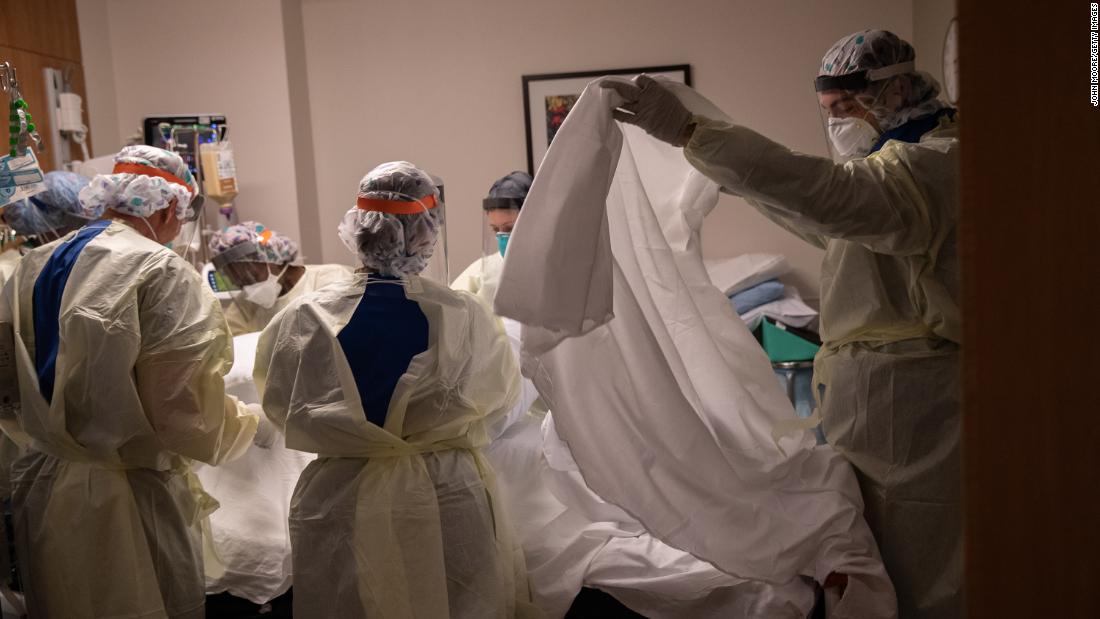[ad_1]
One model cited by the White House now predicts 200,000 US deaths from coronavirus by October 1 — an increase of 30,000 deaths since last week’s projection by the Institute for Health Metrics and Evaluation at the University of Washington.
“Increased mobility and premature relaxation of social distancing led to more infections, and we see it in Florida, Arizona, and other states,” said Ali Mokdad, one of the creators of the model.
But IHME projections have been low in the past, and others say the death toll could be higher.
“Sadly, I think this 200,000 number may be a under prediction based on what we’re starting to see in several states across the country,” CNN Chief Medical Correspondent Dr. Sanjay Gupta said.
How states are trending
- 18 states are seeing upward trends in newly reported cases from one week to the next: California, Oregon, Nevada, Arizona, Montana, Wyoming, Texas, Oklahoma, Arkansas, Louisiana, Mississippi, Alabama, Georgia, Florida, South Carolina, North Carolina, Alaska and Hawaii.
- 10 states are seeing steady numbers of newly reported cases: Washington, Utah, South Dakota, Kansas, Iowa, Tennessee, Ohio, West Virginia, Maine and Rhode Island.
- 22 states are seeing a downward trend: Idaho, Colorado, New Mexico, Nebraska, North Dakota, Minnesota, Missouri, Wisconsin, Michigan, Illinois, Indiana, Kentucky, Virginia, Pennsylvania, Maryland, New Jersey, New York, Connecticut, Massachusetts, Vermont, New Hampshire and Delaware.
Why doctors are worried
“What we’re seeing from footage — especially from the states where we see these cases rising — is that states are not opening gently. They’re opening with lots of crowds,” said Dr. Rochelle Walensky, chief of the infectious diseases division at Massachusetts General Hospital.
“They’re opening with a lack of face masks … And when that happens, you don’t need too many infections for cases to soar.”
Yes, testing is up. But so are hospitalizations
Some governors have attributed their rise in Covid-19 cases to increased testing.
It’s true that testing has improved, said Dr. Anthony Fauci, director of the National Institute of Allergy and Infectious Diseases.
But “when you start seeing more hospitalizations, that’s a surefire sign that you’re in a situation where you’re going in the wrong direction,” Fauci said.
Some places reconsider plans to reopen
Texas’ capital city, Austin, has extended stay-at-home orders through August 15, Mayor Steve Adler announced Monday, citing a spike in new coronavirus cases.
North Carolina’s next steps are not yet clear. Gov. Roy Cooper told reporters Monday that he would announce early next week whether the state will still under phase three of the state’s reopening later this month.
The rates of new cases in New Jersey are trending downward, but Gov. Phil Murphy said he wants the state to proceed cautiously.
“We’re not just going to throw up our doors all at once as other states have done,” Murphy said. “We’ve already paid a huge, huge almost unfathomable price.”
Arkansas, on the other hand, still plans to move into phase two of its reopening despite recording its largest daily spike in new cases on Friday — 731 new cases.
“I hope we don’t repeat” that, Gov. Asa Hutchinson said.
But “we can’t have life on hold for six months to a year until there’s a vaccination … We have to be able to carry on life and business.”
Scientists are learning more about the virus
The National Institutes of Health launched a database to collect medical information on US coronavirus patients to learn more about the virus.
“This effort aims to transform clinical information into knowledge urgently needed to study COVID-19, including health risk factors that indicate better or worse outcomes of the disease and identify potentially effective treatments,” the NIH said.
The Red Cross announced it will start testing all blood, plasma and platelet donations for coronavirus antibodies to help educate donors about whether they’ve already been exposed to the virus.
The test, which has been authorized by the US Food and Drug Administration, shows whether a person’s immune system has produced antibodies to fight the virus.
“We were pretty shocked as it was playing out,” Dr. Charles Schleien said. “The whole syndrome came out of the blue. We had been comfortable for months (in the belief) that kids weren’t affected all these months by coronavirus.”
CNN’s Andrea Kane, Naomi Thomas, Janine Mack, Sharif Paget, Raja Razek, Maggie Fox, Shelby Lin Erdman, Amanda Watts and Hollie Silverman contributed to this report.
[ad_2]
Source link





